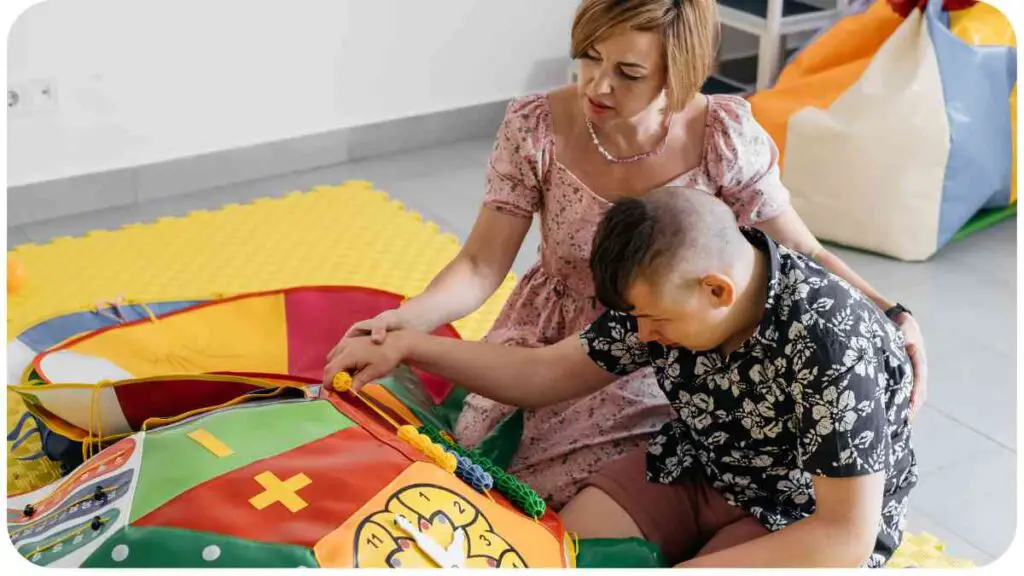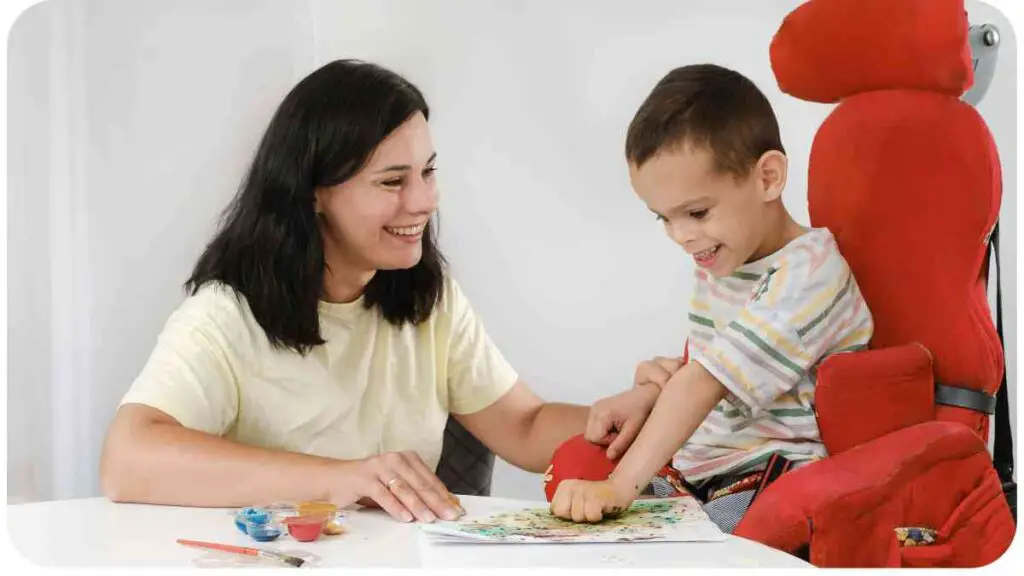Welcome to our comprehensive guide on the benefits of sensory toys for adults. In this article, we will explore how sensory toys can provide a range of advantages for individuals of various ages and abilities.
Whether you are seeking stress relief, improved focus, or a way to enhance occupational therapy sessions, sensory toys can offer a multitude of benefits. Throughout this article, we will delve into the various ways in which these toys can positively impact adults’ lives.
| Takeaways |
| Sensory toys offer numerous benefits for adults |
| They can promote relaxation, mindfulness, and sensory processing |
| Sensory toys can aid in self-regulation and emotional well-being |
| These toys can enhance cognitive function and problem-solving skills |
| Sensory toys have applications in therapy, rehabilitation, and dementia care |
| Choosing appropriate sensory toys is essential for maximum benefit |
| Sensory toys provide a tangible and enjoyable way to engage with the senses |
| Incorporating sensory toys into daily routines can improve well-being |
| Sensory toys are not just for children – adults can benefit from them too |
| Explore further resources to learn more about choosing and using sensory toys for adults |
2. Understanding Sensory Toys
Sensory toys are specially designed objects that engage one or more senses. They are created with different materials, textures, colors, and sounds to stimulate sensory experiences. These toys can include fidget spinners, stress balls, liquid timers, tactile discs, and many more.
Sensory toys are not just limited to children; they also play a crucial role in adult self-care, therapeutic interventions, and stress management techniques.
Discover the calming influence of sensory toys on adult stress. Explore the benefits of sensory engagement for relaxation and well-being. Embrace a new approach to stress relief through the power of sensory experiences.
3. The Benefits of Sensory Toys for Adults

Sensory toys can provide a myriad of benefits for adults by promoting relaxation, reducing stress and anxiety, improving concentration, enhancing creativity, boosting problem-solving skills, and aiding in physical rehabilitation.
In the following sections, we will explore these benefits in more detail and discuss practical applications for each category.
4. How Sensory Toys Can Reduce Stress and Anxiety
Stress and anxiety are common issues faced by adults in today’s fast-paced world. Sensory toys offer a unique way to alleviate these feelings and promote a sense of calm. By engaging with sensory toys, individuals can redirect their focus, lower cortisol levels, and find comfort and distraction from daily worries.
Embark on a journey to understand how sensory toys cater to the unique needs of special needs children. This guide on sensory toys for special needs provides valuable insights for parents and caregivers seeking effective tools for their children’s development.
Table 1: Sensory Toys for Stress and Anxiety Relief
| Toy | Description |
| Squishy Stress Ball | A soft ball that can be squeezed and kneaded to relieve tension |
| Fidget Spinner | A handheld device that spins, providing a calming effect |
| Tactile Disc | A textured disc that offers a soothing tactile experience |
| Liquid Timer | A timer filled with liquid to create visually captivating patterns |
5. Enhancing Concentration and Focus with Sensory Toys
Trouble with concentration and focus is a common challenge faced by many adults. Sensory toys can serve as valuable tools to improve attention span and help individuals stay on task. These toys provide a sensory experience that engages the individual’s senses and allows them to redirect their focus in a productive manner.
Table 2: Sensory Toys for Concentration and Focus
| Toy | Description |
| Fidget Cube | A cube-shaped toy with various sensory activities |
| Tangle Toy | A twistable toy that improves focus and hand coordination |
| Weighted Lap Pad | A lap-sized pad with added weight for grounding |
| Infinity Cube | A folding puzzle toy that aids in focus and relaxation |
6. Promoting Relaxation and Mindfulness
In today’s fast-paced world, finding moments of relaxation and practicing mindfulness is essential for overall well-being. Sensory toys can be an excellent tool in achieving a state of relaxation and promoting mindfulness practices.
By engaging with sensory toys, individuals can focus on the present moment, reduce stress, and cultivate a sense of calmness.
Delve into the realm of stress management with the profound impact of sensory toys. Learn how sensory toys help both children and adults manage anxiety and stress. Discover effective strategies for incorporating sensory toys into daily routines for a calmer, more balanced life.
Table 3: Sensory Toys for Relaxation and Mindfulness
| Toy | Description |
| Zen Garden | A miniature garden with sand, stones, and tools for relaxation |
| Aromatherapy Diffuser | A device that disperses essential oils for a calming atmosphere |
| Weighted Blanket | A heavy blanket that provides a comforting and calming sensation |
| Meditation Chime | A bell or chime used to aid in meditation and relaxation |
7. Sensory Toys for Sensory Processing Disorders

Individuals with sensory processing disorders (SPD) may struggle with processing and responding to sensory information. Sensory toys can be immensely beneficial for these individuals by helping regulate sensory inputs and improving their ability to engage with the environment.
Table 4: Sensory Toys for Sensory Processing Disorders
| Toy | Description |
| Sensory Chew Necklace | A wearable necklace designed for individuals who seek oral stimulation |
| Therapy Putty | Stretchable putty used for hand exercises and sensory integration |
| Noise-Canceling Headphones | Headphones that reduce background noise and sensory distractions |
| Vibrating Massage Pillow | A pillow that provides soothing vibrations for sensory relaxation |
8. Sensory Toys for Autism Spectrum Disorders
Autism spectrum disorders (ASD) can involve sensory sensitivities and challenges in social interactions. Sensory toys play a crucial role in supporting individuals with ASD by providing sensory opportunities, promoting social engagement, and aiding in self-regulation.
Uncover the cognitive benefits of sensory toys for children’s development. Explore a comprehensive guide on how sensory toys enhance cognitive development. Gain insights into selecting and utilizing sensory toys to foster cognitive skills in children, making learning an engaging and enjoyable experience.
Table 5: Sensory Toys for Autism Spectrum Disorders
| Toy | Description |
| Visual Timer | A timer with a visual representation of time passing |
| Oral Motor Chew Tool | A chewable tool designed to provide oral sensory input |
| Social Story Book | A book that uses visual cues to explain social situations |
| Weighted Vest | A vest with added weight to promote a sense of calm and security |
9. Boosting Creativity and Problem-Solving Skills
Sensory toys can also serve as catalysts for boosting creativity and problem-solving skills in adults. By engaging with these toys, individuals can explore different textures, shapes, and sensations, igniting their imagination and promoting innovative thinking.
Table 6: Sensory Toys for Boosting Creativity and Problem-Solving Skills
| Toy | Description |
| Magnetic Building Blocks | Blocks with magnets for building and creating |
| Kinetic Sand | Moldable sand that provides a tactile and sensory experience |
| Rubik’s Cube | A classic puzzle toy that challenges problem-solving skills |
| Art Therapy Kit | A set of materials for artistic expression and relaxation |
10. Sensory Toys for Physical Rehabilitation
Sensory toys can be incorporated into physical rehabilitation programs to enhance motor skills, coordination, and proprioception. These toys provide sensory feedback that aids in improving movement, balance, and overall physical well-being.
Navigate the intricacies of sensory processing disorder and the role of sensory toys in alleviating challenges. This guide on sensory toys for SPD sheds light on how carefully chosen toys can significantly impact the lives of individuals with sensory processing disorders. Explore practical insights and recommendations for better understanding and managing SPD through sensory engagement.
Table 7: Sensory Toys for Physical Rehabilitation
| Toy | Description |
| Therapy Putty | Moldable putty used to strengthen hand muscles |
| Balance Board | A board used to improve balance and stability |
| Therapy Balls | Balls of different sizes and textures for sensory input |
| Resistance Bands | Elastic bands used for strengthening and stretching |
11. Improving Cognitive Function with Sensory Toys
Sensory toys can also play a role in improving cognitive function and mental acuity in adults. By engaging with these toys, individuals can enhance their memory, problem-solving abilities, and overall cognitive skills.
Table 8: Sensory Toys for Improving Cognitive Function
| Toy | Description |
| Memory Game | A game that challenges memory and recall abilities |
| Puzzle Sets | Jigsaw puzzles or brain teasers that promote problem-solving skills |
| Brain Training Apps | Smartphone apps designed to improve cognitive functions |
| Word and Number Games | Games that stimulate linguistic and mathematical abilities |
12. Sensory Toys for Dementia and Alzheimer’s Disease
Sensory toys can bring significant benefits to individuals dealing with dementia or Alzheimer’s disease. These toys can help stimulate memory, evoke positive emotions, and provide a sense of comfort and familiarity.
Table 9: Sensory Toys for Dementia and Alzheimer’s Disease
| Toy | Description |
| Reminiscence Music Player | A music player that allows individuals to listen to familiar songs |
| Memory Photo Albums | Photo albums with pictures that evoke memories |
| Soft Stuffed Animals | Plush animals that provide comfort and companionship |
| Sensory Reminiscent Kits | Kits with familiar scents and textures for sensory stimulation |
13. Sensory Toys in Occupational Therapy
Occupational therapy often incorporates sensory toys to improve fine motor skills, sensory integration, and overall functional abilities. These toys can be instrumental in facilitating therapy sessions and achieving therapy goals.
Table 10: Sensory Toys in Occupational Therapy
| Toy | Description |
| Therapeutic Putty | Special putty used for hand strengthening and dexterity |
| Squeeze Balls | Balls that provide tactile feedback and strengthen hand muscles |
| Weighted Pencils | Pencils with added weight for improved handwriting skills |
| Sensory Brushes | Brushes with different textures to provide sensory stimulation |
14. Using Sensory Toys for Self-Regulation
Sensory toys can be powerful tools for self-regulation, helping individuals manage their emotions and behaviors. These toys provide a sensory outlet that promotes calmness and aids in self-soothing.
Table 11: Sensory Toys for Self-Regulation
| Toy | Description |
| Calming Weighted Blanket | A weighted blanket that provides a comforting and grounding effect |
| Fidget Toys | Small toys designed for repetitive movements and sensory input |
| Sensory Bottles | Bottles filled with various materials that create sensory experiences |
| Scented Stress Balls | Stress balls infused with calming scents |
15. Sensory Toys for Calming and Emotional Regulation
Sensory toys can be particularly useful in promoting emotional regulation and providing a sense of calm during times of stress or anxiety. These toys offer a tangible way to manage emotions and provide a soothing effect.
Table 12: Sensory Toys for Calming and Emotional Regulation
| Toy | Description |
| Liquid Motion Bubbler | A toy that creates visually soothing patterns |
| Stress Relief Slime | Stretchable slime that provides a satisfying sensory experience |
| Lavender Scented Eye Pillow | An eye pillow filled with dried lavender for relaxation |
| Mood Putty | Putty that changes colors based on touch and temperature |
Conclusion
Sensory toys are not just for children; they offer a multitude of benefits for adults as well. From stress and anxiety relief to promoting creativity, problem-solving skills, and aiding in various therapeutic interventions, sensory toys have a wide range of applications. By incorporating sensory toys into your daily routine or therapy sessions, you can experience improved well-being, enhanced focus, and increased relaxation. Embrace the benefits of sensory toys and unlock their potential for personal growth and development.
Further Reading
Here are some additional resources for further reading on the benefits of sensory toys for adults:
- Choosing Sensory Toys for Adults – This blog post provides insights into selecting sensory toys that are appropriate for adults, discussing their benefits and how to choose the right ones for specific needs.
- The Benefits of Sensory Toys and Support Tools – This article explores the benefits of sensory toys and support tools, focusing on their positive impact on emotional regulation, sensory processing, and overall well-being.
- The Benefits of Sensory Activities for People of Any Age – This informative blog post discusses the wide-ranging benefits of sensory activities for people of all ages, highlighting their positive effects on mental health, cognitive function, and stress reduction.
FAQs
Here are some frequently asked questions about sensory toys for adults:
Q: Can sensory toys help adults with ADHD?
A: Yes, sensory toys can assist adults with ADHD by providing sensory input and promoting focus, attention, and self-regulation.
Q: Are there specific sensory toys for older adults?
A: Yes, there are sensory toys specifically designed for older adults, such as sensory puzzles, memory games, and reminiscence kits that cater to cognitive stimulation and memory recall.
Q: Can sensory toys be used in workplace settings?
A: Yes, sensory toys can be used in workplace settings to promote stress relief, focus, and relaxation. They can be discreet and effective tools for enhancing productivity and well-being.
Q: How can sensory toys benefit individuals with dementia?
A: Sensory toys can benefit individuals with dementia by stimulating their senses, evoking positive emotions, and providing a sense of comfort and familiarity.
Q: What are some safety considerations when using sensory toys for adults?
A: It is important to choose sensory toys that are age-appropriate, durable, and free from any potential choking hazards. Additionally, it is advisable to supervise individuals while using sensory toys to ensure safe play and usage.

Meet Hellen James, the multi-talented writer and nurturing mother who takes young readers on a thrilling journey through her sensory-infused blog. Drawing inspiration from her own experiences as a parent.

